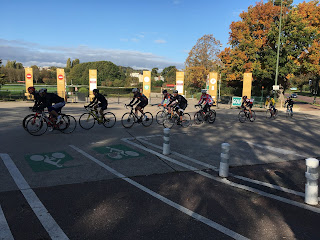One of the groups circling L'Hippodrome in Paris
On my first full day in Europe, and the only day in Paris before leaving for battlefields in eastern France and Belgium, I rode the daily training race in Paris. Each day, year round, the two-mile perimeter road around l'Hippodrome, the horse racing track in southwest Paris, is closed to traffic from 10am till dark.
Every day groups of cyclists ride the circle, most in groups, some by themselves. The speeds vary from two guys in their 80s I saw on my second lap going about 10mph to the first group I rode in which was averaging 22 mph. I stayed with that group for a couple of laps and joined a group we passed which was traveling about 2mph slower.
The road around the horse racing track rises slightly on the east side and goes down through the turn to the west. The road is fifty feet wide on sides of the oval, but narrows to fifteen feet on the turn at the south end and is just a six-foot wide path at the north end.
When the pack is silent, it is clearly no different than any pack I have ridden in anywhere in the world. The following distances, the way people pass each other, and even the young kid who attacks the group racing ahead, only to get caught on the uphill stretch where there was a headwind, is the same in Philadelphia, Paris or Prague. Between the wind and my inadequate skill in listening to spoken French, I did not catch much of the conversation, but no one speaks deeply in a fast-moving group of 20 riders.
If the weather is good and my knee is still good, I hope to ride again in Paris near the end of the trip.
The grandstands of l'Hippodrome seen from the east side.













